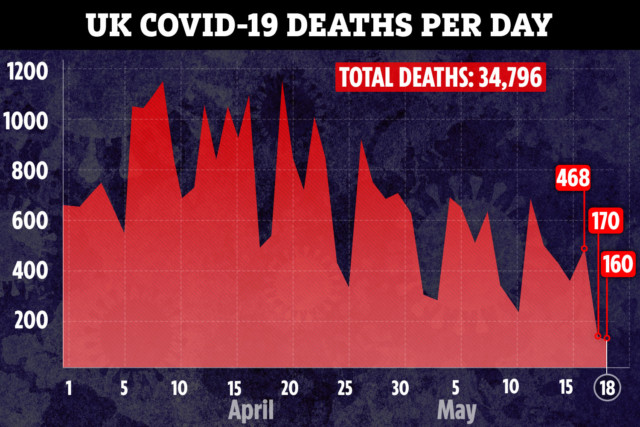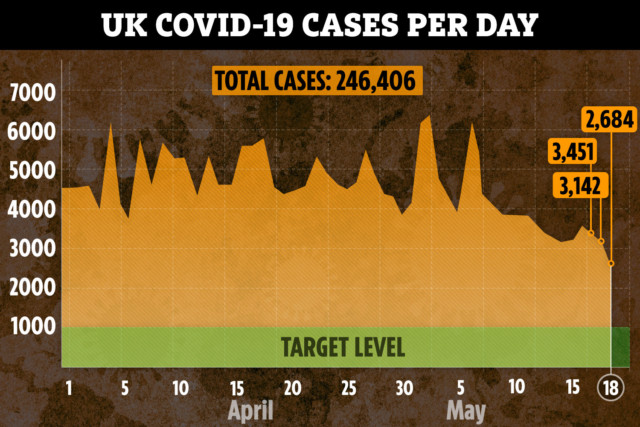YOUNGER and older workers are the hardest hit by the squeeze on earnings during the coronavirus crisis, research has found.
More than one in three 18-24 year olds are receiving less pay than they did at the start of the year.
And three in ten workers in their early 60s have seen their income fall during the crisis.
This compares to less than a quarter of workers aged 35-49 who have seen a fall in their income.
The study by the Resolution Foundation warned that wage reductions and job losses could hit the incomes of some workers in younger and older age brackets permanently.
Younger workers risk their pay being scarred for years to come, while older workers may end up involuntary retired well before reaching their state pension age, it said.
The Resolution Foundation described this contrast in the way earnings have been hit as a “U-shaped” crisis for living standards.
A survey carried out along with the Health Foundation of 6,000 adults in early May found young people are disproportionately affected because they are more likely to work in the hardest hit sectors such as hospitality, leisure and retail.
Among 18-24 year olds, 35 per cent are earning less than they did before the outbreak.
VIRUS HITS PAY
Employees in their early 60s are the next most likely to be receiving less pay, with 30 per cent affected.
The Foundation said employees across all age groups are more likely to be earning less than they did in January than earning more, though young and older workers are most affected.
Young people are the most likely to have lost work, the research suggests.
Around one in three 18 to 24-year-old employees have lost work, either through being furloughed (23%) or losing their jobs completely (9%).
A fifth (20%) of employees in their late 20s (aged 25 to 29) have either been furloughed or lost their jobs, along with nearly a fifth (18%) of workers in their early 60s (aged 60 to 64).
Employees aged 35 to 44 are the least likely to have been furloughed or lost their jobs, with around 15% experiencing this since the crisis started, the report found.


The Foundation said younger and older employees could be affected in different ways.
Younger workers could potentially see a long term reduction in their living standards.
Older workers risk being involuntary retired well before they can start receiving the state pension, or not having time to make up their current earnings shortfall.
The Foundation said the scale of pay reductions since the crisis would be even greater were it not for the Job Retention Scheme.
The research found around one in five furloughed employees are still receiving full pay, despite state support being capped at 80%, including over a quarter of workers aged 35 to 44.
The foundation, whose work focused on improving the living standards of those on low to middle incomes, said the Government needs to start preparing its response to the next phase of the crisis, which should include broader measures to boost demand in the economy and raise household incomes.
‘EYE OF THE STORM’
Maja Gustafsson, a researcher at the Resolution Foundation, said: “While young people are in the eye of the storm, they are not the only group who are experiencing big income shocks.
“Britain is experiencing a U-shaped living standards crisis, with workers in their early 60s also badly affected.
“That is why the Government’s strategy to support the recovery should combine targeted support to help young people into work, with more general stimulus to boost demand across the economy and help households of all ages.”
Meanwhile the Chancellor revealed that more than two million claims for grants worth £6 billion have been made under the Government’s support scheme for self-employed workers.
But he came under mounting pressure to extend the scheme in line with the job retention scheme for employees, which will now run until October. The self-employed scheme only runs until the end of next month.
Rishi Sunak told the Commons: “The self-employment support scheme opened last week ahead of schedule and provides support worth up to £7,500 to millions of individuals.
“I’m pleased to tell the House that at the end of yesterday there had been more than two million claims with grants worth £6 billion in total being claimed for.
“Those people will have the money in their bank accounts within six working days of their claim and of course I’ll keep this scheme under review.”
- GOT a story? Ring HOAR on 0207 782 4104 or WHATSAPP on 07423720250 or email [email protected].









